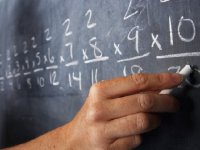Math as a Social Justice Lever
Some suggest going easy on kids who’d rather drop out than study math, yet math remains an essential life tool across racial, gender, and class lines.
Your content has been saved!
Go to My Saved Content.In the book Radical Equations, the legendary Robert Moses raises the math bar for the entire country, not just as a required subject, but as a social justice issue. Yet, according to him, innumeracy is as acceptable for society as illiteracy is unacceptable. He writes:
Algebra 1 as the End of the Road?
Even though Americans generally believe that math is the most important subject in school, students tend to drop out at higher rates when introduced to harder math and sciences. It seems the desire is there, but the skill and understanding are not. While there are a plethora of reasons for students to drop out, math always seems to come up as one of those levers with my former students.
In recent times, Andrew Hacker, Grant Wiggins, and Nicholson Baker have come for algebra's neck, stipulating that advanced algebra need not be required for students. The argument goes, "If the students weren't required to take anything above algebra, they wouldn't drop out as often." I agree to the extent that I would love for all my students to make it through high school without too much hassle. We have to reorganize the idea of completion and college readiness to assure that all students have an equitable chance at college or a career of their choosing.
But then it makes me wonder if we've stepped back far enough from these statements to understand the implications of limiting higher-order math. I wonder if these folks think similarly of English, and whether kids should have to read anything above Romeo and Juliet, and not Macbeth or Othello. Or the script to the Leonardo DiCaprio version of the movie. Or the manual to the DVD or mobile device that once played the movie.
As far as I can see, higher-level literacy isn't that necessary to the average citizen, either. Or do we not place the same restrictions on literacy as we do on math?
Math Access Is a Right
Those who get Algebra 2 will mostly likely be the ones perceived to be going to college, and that usually leads to discriminatory practices about who's going to get the "badge" for math completion. Those in the higher rungs of society will get Algebra 2 plus whatever other math will assure that they can apply to technical careers or other careers of their choosing. Those in the lower rungs (an increasing section, mind you) will be relegated to Algebra 1, and courses like "Using A Calculator To Plot A Graph" or "Statistics for Those Who Weren't Allowed to Take Algebra 2."
I’m adamant about access and the opportunity for all students to get access to the most information possible. Do I think math needs reform? Absolutely. Do I think eliminating Algebra 2 as a bridge toward that is the way to go? Absolutely not. This will take a concerted effort from educators (specifically K-12) to reconsider what needs to get taught across the board. I know the Common Core Learning Standards were supposed to do that, but I'm unconvinced as of now. Equity shows up here as the foundation for ensuring that all students have the opportunity to take math, and have multiple doors open to them because of the math they take.
If someone said, "Let's end compulsory higher-order math tomorrow," and the fallout happens across racial, gender, and class lines, then I could be convinced that this was a step toward reform. Yet, given the state of what our culture thinks about math right now, in all of our school systems, I can't risk the possibility that our lowest-income schools don't have access to the same knowledge that their higher-income-level counterparts do.
